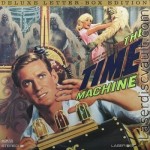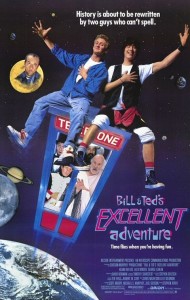Lost In Myth: Time Travel Movies, Myths, & Science

Right from the start of Lost’s fifth season premiere, “Because You Left,” we learn that the island is officially capable of moving through time and space. Time travel has been a theme of Lost since at least Desmond’s mind-flashes during season three, and perhaps as far back as the “Adam and Eve” skeletons of season one. Now however, it has been unequivocally confirmed as a very real, functioning principle within the show’s mythology. Or, has it?
Lost often has a rather sly way of communicating with viewers through its characters’ dialogue. For example, during the second episode of the premiere, “The Lie,” Hurley assures his mother that “everything is going to make sense.” Surely, this message was directed at those befuddled viewers trying to keep up with all the convoluted storylines and timelines. Similarly, after a rather bizarre conversation with Dr. Pierre Chang during the first episode, an incredulous construction worker laments, “Time travel! How stupid does that guy think we are?” Indeed, those fans hoping that Lost will end up with a purely rational explanation were likely thinking the same thing. Are the writers insinuating that something other than time travel is going on? That DHARMA, known for its misleading information (Chang himself has gone by three aliases) is just providing some more? Perhaps, but even if time travel does turn out to be a reality within the confines of the show, purists can take solace that it isn’t such a far-fetched concept after all.
For most of us, our idea of time travel comes from what we’ve traditionally seen in the movies. According to Hollywood, time travel works in one of three ways. In the first, time can be manipulated, enabling Marty McFly to go back in time  and prevent his parents from ever meeting, thereby, risking his own existence. Of course, the paradox is that if Marty had ceased to exist, he never would’ve been able to go back in time to begin with, so something seems off about this perspective. The second way time travel is portrayed, is that it cannot ever be changed because whatever you do has already happened. This is the perspective of The Terminator films. By going back to prevent John Connor from being born, the machines, in fact, bring about his very creation. Had the machines understood this, they never would’ve gone after Sarah Connor to begin with, so John’s father never would’ve come to her rescue and slept with her. So, this direction seems flawed as well. Finally, the third view of time travel is the Bill and Ted’s Excellent Adventure way, which is basically, sometimes you can change time and sometimes what you try to change has already happened. In other words, the rules bend to whatever works best in a particular scene. This direction isn’t even really trying.
and prevent his parents from ever meeting, thereby, risking his own existence. Of course, the paradox is that if Marty had ceased to exist, he never would’ve been able to go back in time to begin with, so something seems off about this perspective. The second way time travel is portrayed, is that it cannot ever be changed because whatever you do has already happened. This is the perspective of The Terminator films. By going back to prevent John Connor from being born, the machines, in fact, bring about his very creation. Had the machines understood this, they never would’ve gone after Sarah Connor to begin with, so John’s father never would’ve come to her rescue and slept with her. So, this direction seems flawed as well. Finally, the third view of time travel is the Bill and Ted’s Excellent Adventure way, which is basically, sometimes you can change time and sometimes what you try to change has already happened. In other words, the rules bend to whatever works best in a particular scene. This direction isn’t even really trying.
Now, here comes Lost to shake things up a bit. According to Lost’s time travel mythology, you can’t really change what’s meant to happen because the universe will course-correct, resulting in the same overall result. The only thing you can change, then, are the details. Strange how what seems to be the most confusing and possibly boring (what’s the point?) view of time travel seems to have resonated with so many people. Perhaps then there is some truth to this perspective, which, just to clarify, did not originate with Lost. In fact, the idea that destiny cannot be manipulated has been showing up in quite a lot of movies lately including Donny Darko, Final Destination, and to a lesser extent, The Butterfly Effect. With so many writers—our modern-day shaman—honing in on this theme, could they be picking up on something? Are we getting close to being able to actually travel through time? And if so, how do physicists think it would actually work?
While no one knows for sure, scientists at CERN in Switzerland are hoping to find out. Using a gigantic particle smasher known as the Large Hadron Collider, they hope to release so much energy that it rips through the fabric of space-time, creating a wormhole of alternate dimensions and timelines. Think Stargate or Sliders, but for real. If we are on the verge of time travel then, will we be able to go back to the age of dinosaurs or kill Hitler? Just as stated on Lost, physicists seem to believe that there are rules—one of them being that you can only travel back to when time travel already existed. So while we may not be able to go back in time, time travelers from the future may soon be able to visit us. Should they do so, the question remains—will they be able to change their time by affecting ours?
Not exactly. Many quantum physicists believe that time is neither changed like Back to the Future nor set in stone like The Terminator. What they believe is that an infinite number of timelines already exist, with an infinite combination of events in each. So if you were to go back in time and change something, you would instantly jump to a new timeline where that something happens. And the bigger your change, the more unrecognizable your new time would start to become. The amount of time you spent in this new timeline would also affect it, to the point that you would soon be unable to predict much of anything in this alternate time at all. So much for getting rich betting on sports games. Even worse, once you traveled back in time, it would be very unlikely that you would be able to return to the exact combination of events you remembered as your own time. This idea of time travel is very similar to that portrayed in Ray Bradbury’s A Sound of Thunder. In this story, a time traveler accidentally steps on a butterfly during the prehistoric age, setting off a chain of events that devastates his time.
Suddenly, time travel doesn’t seem so sexy anymore. But then why are so many movies and TV shows bringing up these themes? Can we somehow utilize their wisdom in our own lives? I believe there absolutely is a reason we are getting these time travel themes and there is a very real way we can reap their benefits in our day-to-day lives. In other words, besides the very real scientific possibilities of time travel, there are mythological implications that each of use can use without the need for any time machine, wormhole, or inter-dimensional gateway. And I have every intention of telling you exactly what they are so that you may begin to reap their benefits. But due to the length of this column, these revelations will unfortunately have to wait for some undefined moment in the future. Surely, as a fan of Lost, this is something you’re already used to.
Marc Oromaner is a New York City writer whose new book, The Myth of Lost offers a simple solution to Lost and how it provides hidden insight into the mysteries of life. He can be contacted in the discussion section of The Myth of Lost Facebook page.
The Myth of Lost is available on Amazon and barnesandnoble.com.


